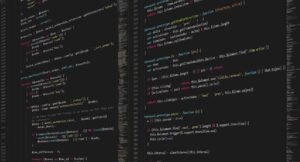AI and the Future of Humanity
Artificial Intelligence (AI) has been rapidly advancing in recent years, and its impact on humanity is becoming more
prominent. With the potential to revolutionize various industries, AI raises both excitement and concerns about the
future. In this article, we will explore the influence of AI on different aspects of human life and discuss potential
challenges and opportunities ahead.
Key Takeaways:
- AI has the potential to revolutionize industries and impact various aspects of human life.
- The rapid advancement of AI raises excitement and concerns about the future.
The Transformative Power of AI
**AI** is rapidly transforming industries such as healthcare, finance, transportation, and manufacturing. It has the
ability to automate processes, analyze vast amounts of data, and make predictions with high accuracy. *AI-powered
healthcare systems can assist doctors in diagnosing diseases and finding personalized treatment plans.*
AI’s decision-making capabilities have the potential to enhance efficiency, reduce costs, and improve outcomes in
various sectors. For example, **autonomous vehicles** enabled by AI can revolutionize transportation by reducing
accidents and congestion, and **AI-powered robots** can optimize manufacturing processes and improve product quality.
Challenges and Ethical Considerations
While AI brings significant advancements, it also poses challenges and ethical considerations. One major concern is the
potential impact on *employment*, as AI automation may replace certain jobs. Additionally, the **privacy** of
individuals can be at risk, as AI systems process and store vast amounts of personal data.
- Key challenges and ethical considerations regarding AI:
- Job displacement due to AI automation.
- Privacy concerns with the use of personal data.
- Algorithmic bias and fairness in decision-making processes.
- The potential for AI to reinforce existing inequalities.
The Future of AI and Human Collaboration
The future of AI lies in collaboration between **humans** and machines. As AI systems continue to advance, it is crucial
to establish **ethical guidelines** and regulations to ensure responsible development and deployment. By working
together, humans and AI can leverage each other’s strengths and overcome limitations.
**AI assistive technologies** have the potential to improve the quality of life for individuals with disabilities and
augment human capabilities. For instance, AI-powered prosthetics can enhance mobility, and AI-based communication
systems can enable better access to information for people with visual or hearing impairments.
Impact on Economy and Society
| Job Category | Probability of Automation |
|---|---|
| Telemarketers | 99% |
| Bookkeeping clerks | 98% |
| Cashiers | 97% |
The impact of AI on the economy and society is profound. While certain job categories are at higher risk of
**automation**, new jobs requiring AI skills are also emerging. It is important to invest in **retraining** and the
development of new skills to ensure a smooth transition in the workforce.
| Industry | Market Size (in billions USD) |
|---|---|
| Healthcare | 280 |
| Finance | 190 |
| Manufacturing | 180 |
AI technologies are expected to drive significant economic growth. The healthcare, finance, and manufacturing industries
are projected to experience substantial market expansion in the coming years, creating new opportunities for businesses
and job seekers.
The Future is AI-Driven
As we move forward, the future of humanity will undoubtedly be influenced by AI. By harnessing its potential while
addressing the challenges and ethical considerations, we can shape a future where AI collaborates with humans,
enhancing our capabilities and improving various aspects of our lives.
*It is essential to approach AI development and deployment with careful consideration, ensuring that decisions are made
with the best interests of humanity in mind.*

Common Misconceptions
Misconception 1: AI will replace all human jobs
Many people believe that artificial intelligence (AI) will completely replace human workers, leading to widespread unemployment. However, this is not entirely true. While AI can automate certain tasks and processes, it is unlikely to replace all human jobs.
- AI is better suited for repetitive and predictable tasks.
- Human workers possess skills such as problem-solving and creativity that AI lacks.
- AI can actually create new job opportunities, such as those related to developing and maintaining AI systems.
Misconception 2: AI will become superintelligent and pose a threat to humanity
Another common misconception is that AI will become superintelligent and take control over human beings, leading to a dystopian future. However, this belief is largely based on science fiction rather than reality.
- Current AI technologies are narrow and designed for specific tasks, lacking general intelligence.
- Creating superintelligent AI requires significant advancements in technology and remains a hypothetical scenario.
- Ethical guidelines and precautions can be implemented to ensure AI systems are developed and used in a responsible manner.
Misconception 3: AI is always biased and discriminatory
There is a misconception that AI systems are inherently biased and discriminatory, leading to unfair decision-making. While it is true that AI can sometimes exhibit bias, it is important to understand that biased outcomes are a result of biased data or flawed algorithms rather than the technology itself.
- Developers can proactively address biases by ensuring data sets used to train AI algorithms are diverse and representative.
- Transparent and explainable AI models can help identify and rectify bias issues.
- Ongoing research and development are dedicated to creating AI systems that are more fair and unbiased.
Misconception 4: AI will outsmart humans and control every aspect of our lives
In popular culture, AI is often depicted as a malevolent force that will eventually outsmart humans and gain complete control over our lives. However, this portrayal is an exaggeration and not reflective of the current state of AI technology.
- AI systems are designed to assist and augment human capabilities, not replace or overpower them.
- AI operates within the parameters set by human programmers and is limited by the data it has been trained on.
- Human oversight and control are necessary to ensure responsible development and deployment of AI systems.
Misconception 5: AI is too complex and inaccessible for ordinary people
Some people believe that AI is a highly complex field that is only accessible to experts and professionals. However, AI is becoming increasingly accessible and user-friendly, enabling ordinary individuals to engage with and benefit from AI technologies.
- AI tools and platforms are being developed with intuitive interfaces and simplified functionalities.
- Adoption of AI is expanding across various industries, making it more commonplace and accessible.
- Online resources and educational initiatives are available for individuals to learn and explore AI concepts and applications.

The Impact of AI on Employment
As artificial intelligence continues to advance, there is growing concern about its impact on employment. The table below showcases the percentage of jobs that could be affected by AI in various industries.
| Industry | Percentage of Jobs Affected |
|---|---|
| Manufacturing | 35% |
| Transportation | 50% |
| Retail | 45% |
| Finance | 25% |
| Healthcare | 30% |
The Ethical Dilemmas of AI
While AI holds great promise, it also presents challenging ethical dilemmas. The table below highlights some of the ethical issues associated with artificial intelligence.
| Ethical Dilemma | Examples |
|---|---|
| Privacy | Data breaches and surveillance |
| Job displacement | Replacing human workers |
| Biased decision-making | Discrimination in algorithms |
| Autonomous weapons | Lack of human control |
| Unemployment | Loss of livelihoods |
AI in Healthcare Improvements
The integration of AI in healthcare has shown great potential for enhancing patient care. The following table explores some noteworthy advancements made in this field.
| Advancement | Description |
|---|---|
| Early disease detection | AI algorithms analyzing medical data for early diagnosis |
| Surgical assistance | Robotic technology aiding precision during surgeries |
| Personalized medicine | AI-based treatment plans tailored to individual patients |
| Drug discovery | AI algorithms identifying potential new drugs |
| Mental health support | AI chatbots offering assistance and guidance |
AI in Educational Technology
The integration of AI in educational technology has the potential to revolutionize learning experiences for students. The table below showcases some exciting applications that AI offers in the field of education.
| Application | Description |
|---|---|
| Intelligent tutoring systems | AI-driven platforms providing personalized learning experiences |
| Automated grading | AI algorithms grading assignments and providing instant feedback |
| Virtual classrooms | Immersive environments for remote learning |
| Adaptive learning software | AI systems adjusting curriculum based on student progress |
| Speech recognition tools | Assisting students with language learning |
AI and Cybersecurity
Cybersecurity is a pressing concern in an increasingly connected world. AI can play a crucial role in defending against cyber threats. The following table presents examples of how AI is utilized in cybersecurity.
| Application | Description |
|---|---|
| Behavior-based anomaly detection | Identifying abnormal patterns and potential threats |
| Automated threat response | AI systems taking proactive measures against attacks |
| User behavior analysis | Monitoring user actions to detect suspicious activities |
| Real-time threat intelligence | Machine learning algorithms analyzing vast amounts of data |
| Malware detection | Using AI to detect and mitigate malicious software |
AI in Autonomous Vehicles
The development of AI-powered autonomous vehicles has the potential to transform transportation as we know it. The table presents examples of advanced features in autonomous vehicles.
| Feature | Description |
|---|---|
| Self-parking | Vehicles capable of parking themselves without driver input |
| Lane centering | Automatically keeping vehicles within their lanes |
| Collision avoidance | Sensors detecting potential collisions and taking necessary actions |
| Adaptive cruise control | Automatically adjusting vehicle speed based on traffic conditions |
| Traffic sign recognition | Identifying and interpreting traffic signs for improved safety |
The Future of AI
As AI continues to evolve, the possibilities for its applications are limitless. The table below explores some intriguing concepts that may shape the future of artificial intelligence.
| Concept | Description |
|---|---|
| Artificial general intelligence | AI systems with human-level cognitive abilities |
| Robot companions | AI-powered robots providing companionship and assistance |
| Neural lace technology | Brain-computer interfaces merging human minds with AI |
| Virtual reality integration | Blending AI with immersive virtual environments |
| Quantum computing | Harnessing quantum properties to exponentially increase computing power |
The Role of AI in Creativity
Contrary to popular belief, AI can enhance human creativity and contribute to artistic endeavors. The table below presents examples of AI in the realm of creative expression.
| Application | Description |
|---|---|
| Music composition | AI algorithms generating original musical compositions |
| Visual art generation | AI systems creating unique digital artworks |
| Screenwriting | AI-assisted writing for films and TV shows |
| Design assistance | AI software aiding in graphic design and creative projects |
| Poetry creation | AI algorithms composing poetry and prose |
Artificial intelligence is rapidly shaping the future of humanity, revolutionizing industries, and posing both opportunities and challenges. While some fear the displacement of jobs and ethical concerns surrounding AI, there is no denying the immense potential it holds in healthcare, education, cybersecurity, transportation, and more. From early disease detection to self-driving cars, AI continues to redefine human capabilities. As we look ahead, it is crucial to navigate the evolution of AI carefully, guided by ethical considerations and responsible implementation, to ensure a positive and inclusive future for all.




